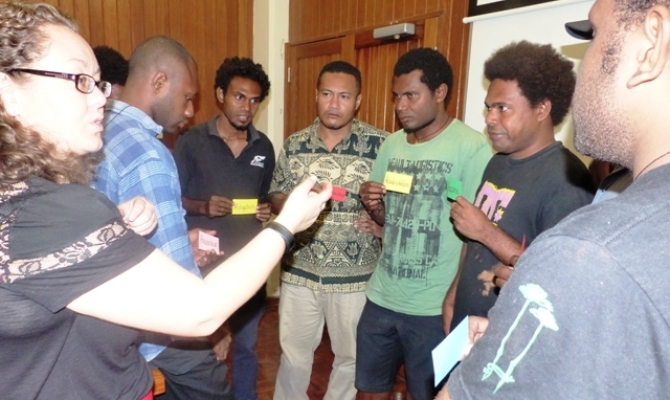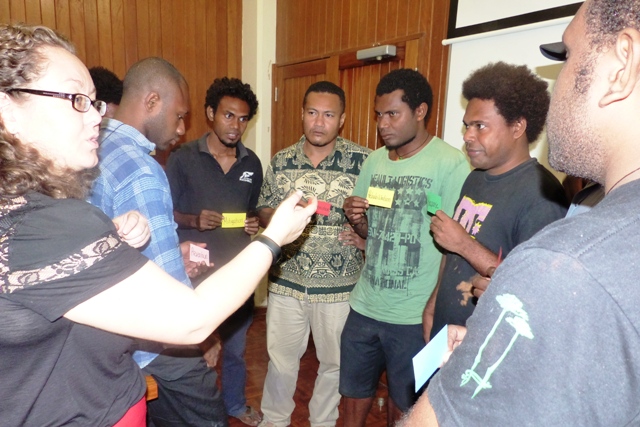
Climate Change Resilience
Solomon Islands journalists received training in climate change and disaster reporting last month learning about the two issues and their impact on one of the biggest industries for the nation - turn fishing.
The training was coordinated by the Secretariat of the Pacific Regional Environment Programme (SPREP) in partnership with the Secretariat of Pacific Community (SPC), Forum Fisheries Agency (FFA), and the Ministry of Environment, Climate Change, Disaster Management and Meteorology (MECDMM).
 Dr Kirstie Meheux of SPC with Solomon Islands media
Dr Kirstie Meheux of SPC with Solomon Islands media
Over 10 journalists from local media learnt about climate change, Ecosystem-based Adaptation, the effect of climate change on fisheries, climate change and gender, disaster risk management, and understanding national warning systems from the National Disaster Management Office.
Knowledge garnered from the training will help the local media better understand the terms related to climate change and disasters and report more accurately.
"I now have a better understanding on how to report on disaster management and response," said Mr. Ronald Toito'ona of the Solomon Star.
"The interactive format of this training was really helpful in helping to get the message across, I fully understand the links between climate change and disasters now and I feel much more confident to report on disasters," said Mr. Irwin Angiki of the Island Sun.
The participants also had the opportunity to visit the Regional Fisheries Surveillance Centre at the FFA, learning about the Regional Observer Program which seeks to enhance Pacific Island countries' efforts to stop illegal, unlicensed and unregulated (IUU) fishing throughout the region.
The training was funded by the Pacific Media Assistance Scheme as part of the Broadcasters Climate and Disaster Resilience Plan project that has been rolled out across eight Pacific island countries including Cook Islands, Kiribati, Palau, Samoa, Solomon Islands, Tonga, Tuvalu and Vanuatu. It is being implemented by SPREP in partnership with SPC. Solomon Islands is the seventh country to complete this project.
For further information, contact Nanette Woonton at [email protected] or Dr Kirstie Meheux at [email protected]
The training was coordinated by the Secretariat of the Pacific Regional Environment Programme (SPREP) in partnership with the Secretariat of Pacific Community (SPC), Forum Fisheries Agency (FFA), and the Ministry of Environment, Climate Change, Disaster Management and Meteorology (MECDMM).
 Dr Kirstie Meheux of SPC with Solomon Islands media
Dr Kirstie Meheux of SPC with Solomon Islands mediaKnowledge garnered from the training will help the local media better understand the terms related to climate change and disasters and report more accurately.
"I now have a better understanding on how to report on disaster management and response," said Mr. Ronald Toito'ona of the Solomon Star.
"The interactive format of this training was really helpful in helping to get the message across, I fully understand the links between climate change and disasters now and I feel much more confident to report on disasters," said Mr. Irwin Angiki of the Island Sun.
The participants also had the opportunity to visit the Regional Fisheries Surveillance Centre at the FFA, learning about the Regional Observer Program which seeks to enhance Pacific Island countries' efforts to stop illegal, unlicensed and unregulated (IUU) fishing throughout the region.
The training was funded by the Pacific Media Assistance Scheme as part of the Broadcasters Climate and Disaster Resilience Plan project that has been rolled out across eight Pacific island countries including Cook Islands, Kiribati, Palau, Samoa, Solomon Islands, Tonga, Tuvalu and Vanuatu. It is being implemented by SPREP in partnership with SPC. Solomon Islands is the seventh country to complete this project.
For further information, contact Nanette Woonton at [email protected] or Dr Kirstie Meheux at [email protected]